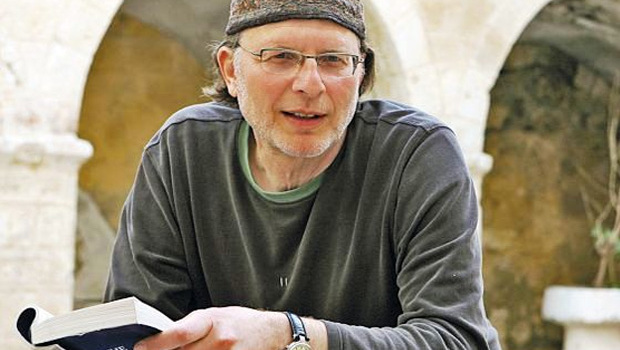The Biz Interview: Simcha Jacobovici – Executive Producer of Biblical Forensics: Real Faces of the Bible
Biblical Forensics: Real Faces of the Bible is a groundbreaking documentary series – hosted by David Berman of CSI: Crime Scene Investigation – that combines archaeology, forensic investigation, and dramatic reenactments. The four-part series follows a team of archaeologists who use advanced facial reconstruction techniques to reconstruct four ancient skulls from the past.
Notable Canadian investigative journalist and documentary filmmaker Simcha Jacobovici is the executive producer of Biblical Forensics: Real Faces of the Bible. In advance of the conclusion of the series – airing Monday, April 29th on Vision TV – he spoke with us about the series and his involvement.
Tell us about Biblical Forensics and what viewers can expect to learn from the series.
We have seen facial reconstructions of ancient people from countries other than Israel. Nothing from the Holy land! Reason being opposition from religious groups that do not want to “disturb the dead”. But now, by doing a CAT scan on skulls, we were able to avoid the controversies. Our experts reconstructed the skulls in a computer and then generated a 3D printing of the skulls. After that we were able to reconstruct the faces using both police manual methods and modern digital technology. In this way, for the first time ever, we come face to face with people who lived in the Holy land during Biblical times.
From a creative standpoint, what is the process like for building a coherent series that combines dramatic recreations and documentary footage?
Coming face to face with Biblical people allows us to get to know their lives. For example, the Biblical enchantress Delilah was from the area of modern day Greece, not the Middle East. The reenactments allow us to recreate those lives. That way the CSI style of investigation opens the door to a historical period. We get to meet the person and at the same time learn about the world he or she came from. Mixing recreation, computer graphics and live action documentary allows us to bring both the faces and their lives to the screen.

Forensic science is a big part of this project. How does forensic science differ in reality from how it is often portrayed on television series?
I don’t know that it differs. We used two forensic artists that actually work with police departments – Victoria Lywood in Montreal and Greg Mahoney in Boston – so the procedure on the Biblical faces was really no different than the procedures that take place when an unidentified body is recovered. In TV drama the difference is not the forensics but the love affairs between the experts. In the documentary we stayed out of the experts’ lives.
You’re the executive producer on this series. Can you explain exactly what your duties were?
I came up with the idea and I had the contacts in Israel to make it happen. I outlined the basic structure which follows our unique genre i.e., investigative archaeology. But after that our talented team of producers and directors took over. Of course, I commented on cuts like all series creators and Vision TV played a big role, especially Joan Jenkinson and legendary executive producer Moses Znaimer.
How did you first become involved in this series?
I do a lot in the world of archaeology, especially Biblical archaeology. I’m friends with the head of forensic anthropology at Tel Aviv University, Professor Israel Hershkovitz. We were discussing the fact that there was no forensic recreation of Biblical faces because of religious opposition when we suddenly realized that today’s digital technology and 3D printing could get around past obstacles. We got very excited about the idea that people would get to meet a Philistine woman who lived in the same place and at the same time as Delilah, or a Galilean who lived in the first century in the area where Jesus preached. After that it was a question of pitching the project and getting the backing of National Geographic in the US and Vision TV in Canada.
You have a strong background and interest in investigative journalism. How does this influence your choice of projects and your creative process?
Usually investigative journalists stick to social issues and politics. People who do historical and archaeological stories are usually more deferential to the professors that they interview. They don’t come from an investigative world. We continue to do investigative social issues e.g., we are premiering our new film on organ trafficking (Tales from the Organ Trade) at Hot Docs in Toronto next week, but we also bring the tools of investigative journalism into the realm of history and archaeology. This gives us a unique niche so we tend to focus on historical stories that have an investigative angle. We like to “decode”. I like to focus on projects where there is a physical artifact at the center of the story which, once decoded, can change the way we see history.
Are there any books relating to film and television that have been influential in your journey?
When The Shooting Stops The Cutting Begins: A Film Editor’s Story by Ralph Rosenblum and Robert Karen. It gave me an insight into the politics and art of filmmaking.
What advice would you give to people who have an interest in becoming producers or directors in the area of documentaries?
Get a general BA first. Documentaries are content driven. If you have nothing to say – no matter how nice your camera angles – your documentaries will not be worth much. On the other hand, if you take some time to formulate your views on things and do lots of reading, you’ll have a story to tell. Only then should you learn the craft of documentary filmmaking.
What is the biggest challenge for Canadian filmmakers today?
Funding is always the biggest challenge. In the past, documentaries had to contend with live action drama. Now, they have to contend with formula driven, factory style documentary reports on the one hand and “reality” television on the other. In the short run, this creates a shrinking market for true documentaries. On the other hand, as the internet becomes a sponsor of content, I believe that documentaries will find a wider market than ever before.
What upcoming projects do you have that you would like to mention?
I’m following up Biblical Forensics with a show called Biblical Codebreakers where we look at recently found artifacts and their impact on our understanding of history. To see what I’m up to you can follow me on my blog or Facebook.
The final installment of Biblical Forensics airs Monday, April 29th on Vision TV.















